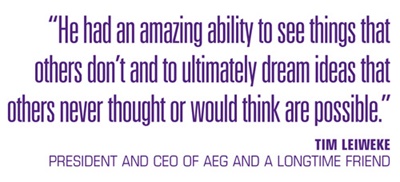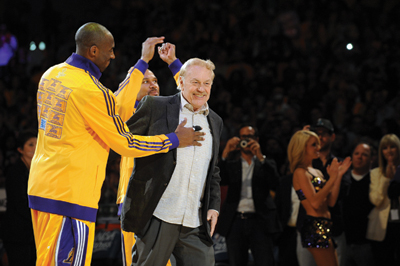Legendary Los Angeles Lakers owner Jerry Buss won 10 NBA championships, appeared in 16 NBA Finals and brought to the league the glittery mix of basketball and Hollywood that came to define his 34-year ownership of the gilded franchise. But Buss, who died last Monday at the age of 80, contributed to sports far more than a string of championships, the Laker Girls and Showtime basketball. He played a revolutionary role in how arenas are priced and how franchises operate.
Leading industry executives who worked with and for Buss, and who negotiated deals against him, described Buss last week as a visionary, someone with a natural instinct for the business, an owner who was willing to spend, and an executive with a razor-sharp style who was able to process numbers in his head faster than those across the table could with calculators.
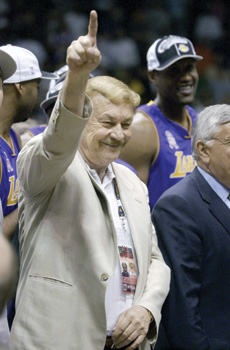 |
Buss celebrates the Lakers’ sweep of the Nets in the 2002 NBA Finals.
Photoy: GETTY IMAGES
|
“He had an amazing ability to see things that others don’t and to ultimately dream ideas that others never thought or would think are possible,” said
Tim Leiweke, president and CEO of AEG and a longtime friend of Buss. “He was unique in his ability to create the next era and age of sports from a business standpoint.”
Buss was considered a pricing pioneer. He created basketball’s version of “beachfront property” inside Los Angeles’ arena, simultaneously driving revenue while attracting the Hollywood star power that clamored to be seen courtside at Lakers games. But Buss’ financial drive wasn’t limited to measures inside the arena. He broke new ground in sports when he convinced Great Western Savings and Loan to put its name atop the Forum in 1988. He also created the Prime Ticket network in the mid-1980s, at the time one of the first sports cable networks and a precursor to the Lakers’ landmark present-day 25-year, $5 billion deal with Time Warner Cable.
“There wasn’t a business aspect that Jerry wasn’t involved in,” said NBA Commissioner David Stern. “Jerry repriced our entire league. Our courtside pricing was miniscule before Jerry. His view was that almost every courtside pricing was too low and he would increase pricing. That enhanced the pressure to keep a winning team and an entertaining atmosphere, but once he got people to the Forum and then the Staples Center, it was self-perpetuating.”
“When he got into basketball in 1979, most of the other owners looked at themselves as owners of teams in somewhat of an inferior sport,” said Chicago Bulls Chairman Jerry Reinsdorf, who bought the Bulls in 1985, adding that when he made the purchase, the first thing he did was look west, to Los Angeles, with an eye on mimicking Buss’ business practices. “He sensed that the public thought a lot more about the league than the owners did, and that’s why he was able to create value and people would be willing to pay for it. When I bought the Bulls, we didn’t have a floor seat, and I quickly learned from Jerry that we were giving away assets. He just has a great sense of how to provide a great product and he knew how to charge for it.”
“Before Buss, there was a very small premium put on front-row seats, like $2 to $10 per seat,” said Jon Spoelstra, who was president of the former New Jersey Nets in the early 1990s. “Within a few years, every team was putting a large premium on those seats. We had a lousy team, but we were able to raise the front-row tickets from $50 per seat per game to $300.”
“I was there at the beginning,” said
Alan Rothenberg, a founder of Major League Soccer and current chairman of the Southern California-based sports sales and advisory firm Premier Partnerships. “I represented Jack Kent Cooke when he sold the Lakers to Jerry Buss. Buss was a real estate syndicator who had done well, but honestly, I don’t think Cooke thought Buss could close the deal. He made Buss give him a big nonrefundable deposit. Buss is probably the most innovative owner in recent times; I also did naming rights for Great Western Forum, which was probably the first naming-rights [deal] that wasn’t with a family name, like Wrigley or Busch. He was also one of the first to do a regional sports deal. It is hard to imagine anything in sports going on today that he was not at the forefront of.”
But Buss’ development of the Lakers didn’t come without consideration for the league. Throughout his ownership, Buss supported key leaguewide initiatives, including subjects such as revenue sharing and the increasingly punitive salary cap, even though they might directly hurt his club’s finances. Buss was about helping the NBA as much as he was about building the Lakers.
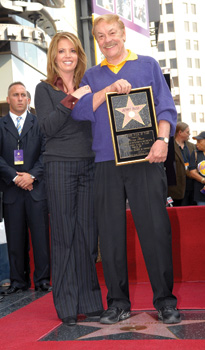 |
Buss with daughter and team exec Jeanie Buss in 2006
Photo: NBAE / GETTY IMAGES
|
“He was the guy who came in and said you should price an arena like real estate, and nobody else had thought of that,” said former NBA Deputy Commissioner
Russ Granik. “It really changed the economics of professional sports. And on a broader level, he always brought a thoughtful, extremely even-tempered voice on league matters. Whether it was collective bargaining or television, if it had long-term benefit for the league, he would see it right away.”
“He was a league man,” said Jerry Colangelo, former Phoenix Suns owner and former NBA Board of Governors chairman. “He was front and center in collective bargaining but he saw the big picture and made the right decisions. He was not locked into a big-market, small-market attitude. I remember the day he was admitted into the league: He was dressed in jeans and a white shirt, with the sleeves rolled up, and he lived his own lifestyle. But he recognized that you could package the whole area of premium seating in ways that no one had dreamed possible. He created tremendous value for his franchise and he passed on great tools for other owners.”
Buss knew that winning championships required the best players. That meant big contracts, but Buss rarely flinched at bringing in the best. Considered one of the most artful negotiators in the industry, he took a nonconfrontational approach to deals. And while he left most of the player negotiating to his general managers, Buss consistently took the lead on franchise-defining deals, including Magic Johnson’s 25-year, $25 million deal in 1981, along with Johnson’s deal years later to buy about 5 percent of the franchise after his retirement.
“When Jerry Buss negotiated a contract with you, he would give you options,” said Lon Rosen, executive vice president and chief marketing officer of the Los Angeles Dodgers, who worked for Buss starting in 1981 and later negotiated against him as Magic Johnson’s agent. “He was very analytical when he did contracts. He would give you, in some cases, three options. One option is you take more risk; another option is he takes more risk; and a third option is no risk. He didn’t handle a lot of the negotiations, but in Magic’s case he did. He had such a love for Magic Johnson.”
“He was thoughtful, diplomatic, fair-minded, and always able to appreciate and understand both sides of a heavily nuanced issue,” said Rob Pelinka, agent for present-day Lakers star Kobe Bryant. “Dr. Buss’ ultra-patient and transparent methods paved a road of almost always getting the result he deemed best for the Lakers.”
“You could make a deal with him on the phone, and it was like iron,” said Donald Dell, co-founder of ProServ, who said he respected Buss more than any team owner with whom he dealt in his decades of player representation. “His word was always good. When I represented James Worthy, we sat for 90 minutes in our first negotiating session. Then there was a bathroom break, and when I came back, he pulled down a blackboard on which the whole offer was completely written out. It completely caught me off guard. He loved to do stuff like that.”
“I think Jerry was, clearly, a players’ owner,” said agent
David Falk. “He was a very innovative owner in understanding, long before other teams did, that it’s not simply sport, but it’s entertainment. He was an outstanding negotiator. Jerry would sit there and do calculations in his head. I had a calculator, and he was doing it in his head. It was very intimidating. It was very
 |
|
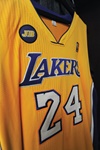 |
Top: Kobe Bryant congratulates Buss as the owner receives his 2009-10 championship ring. Above: A Lakers fan honored Buss with a sign; the Lakers will honor him with a patch.
Photos: NBAE / GETTY IMAGES (3)
|
impressive. He was very low-key. But you should never mistake his being low-key for him not being forceful.”
“He was the ultimate quick study,” said Leonard Armato, who represented both Kareem Abdul-Jabbar and Shaquille O’Neal with the Lakers. “It was always about getting to the point and reaching a solution that worked for both sides. There was never a negotiation with Jerry. It was this sort of easy journey to get to something that was right and fair for both sides. There was never any acrimony.”
Away from the NBA, Buss loved a poker table as much as a Lakers game, and his cunning style played well in both pursuits. He was always thinking ahead, contemplating how any action could be considered across (or around) the table. Through it all, he was known as a loyal boss who took a casual, hands-off approach in running his franchise. He set a relaxed tone within the organization and was viewed within the league as one of the best promoters in the game. Perhaps most important was that he always kept the fans in mind in running the Lakers.
“I couldn’t have a business conversation with him when within the first 30 seconds he would use the word ‘fan,’” said Lakers senior vice president Tim Harris. Harris began working for Buss when he was drafted in the mid-1980s by the then Buss-owned Major Indoor Soccer League Los Angeles Lazers. He went on to work for the Forum in the early 1990s and has worked for the Lakers since. “I would sit with him, and I’d go over suggested prices for the next year. I’d give him gross revenue potentials, and he’d tweak three or four price points, and he’d instantaneously spit out the figures. He had this intuitive feel for what the fan could afford, and he was analytic before there were any analytics. He was looking so far down the road while I was looking down the street.”
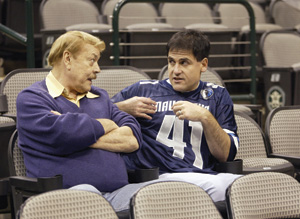 |
Buss talks shop with fellow owner Mark Cuban of the Dallas Mavericks after the Lakers played a regular-season game in Dallas in 2002.
Photo: NBAE / GETTY IMAGES
|
“I was working for World TeamTennis in 1974-75, and we had two owners that were really unique,” said
Bob Kain, now senior adviser at CAA Sports. “One [franchise] was the L.A. Strings, owned by Jerry Buss, and the other was the Boston Lobsters, owned by Bob Kraft. It turned out to be pretty good training. They were both wonderful, but you couldn’t have had more opposite individuals. One guy [Buss] never had a suit; the other guy [Kraft] always wore suits. One guy [Kraft ] wanted a meeting to start at 7 a.m.; the other [Buss] wanted it to start at noon. When I went to work for IMG around 1976, Buss told me I could name my number for Bjorn Borg to play for the Strings — he could just say how many years that would be.”
“Everyone worked very hard, but it was a laid-back environment,” said Scott Carmichael, head of executive search firm Prodigy Sports, who was a Lakers ball boy before going on to hold a number of jobs at the Forum and the Lakers under Buss. “It was very business-casual dress, and that was a big deal then, because we are talking about the early 1980s. Buss just fostered a family type organization, and that produced the kind of loyalty you still see there. He was very accessible, and the press lounge was the place to be postgame. Jerry would always be there hanging out with his entourage. There were times we would leave at midnight, come back the next day, and Jerry would still be up from the night before playing poker with someone like [actor] Gabe Kaplan.”
“What you see on screen and what we’ve done with the Lakers is a total reflection of Dr. Buss’ vision,” said Melinda Witmer, executive vice president and chief video and content officer for Time Warner Cable. “‘What can we do to really serve the fan?’ That was the dominant theme throughout all of our discussions.”
“Who would have thought that a guy with a doctorate in chemistry would end up as a marvelous promoter,” said Pat Williams, Orlando Magic senior vice president. “And one of his greatest strengths was his ability to delegate. He made it clear that you didn’t come running to him if you can handle things.”
“He was a great owner for coaches,” said Hall of Fame coach Jack Ramsay. “He would get you players and spend the money, but you had to win. He never interfered, and you could use any style you wanted, and he gave you the tools to win. He was a formidable force in the NBA.”
Staff writers Terry Lefton, Liz Mullen, Don Muret and John Ourand contributed to this report.



